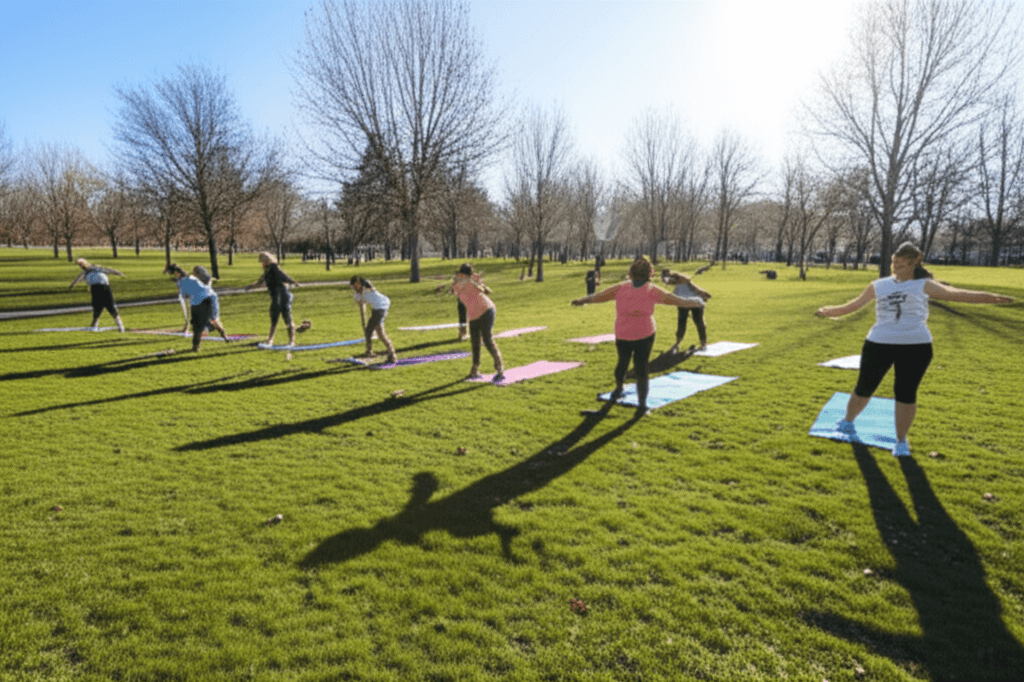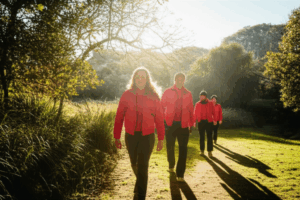In a world that constantly demands our attention and energy, nurturing our mental health is more crucial than ever. While therapy and medication play vital roles, the profound connection between our physical well-being—specifically exercise and nutrition—and our mental state is increasingly recognized by science. This 31-day plan offers a holistic roadmap, combining targeted workouts and mindful eating strategies, designed to foster a stronger mind-body connection and elevate your mood, resilience, and overall mental clarity.

The Mind-Body Connection: How Exercise and Diet Impact Mental Health
The intricate relationship between our physical and mental health is undeniable. Our bodies and brains are not separate entities; what affects one profoundly impacts the other.
The Science Behind Exercise and Mood
Regular physical activity is a powerful tool for improving mental health and emotional well-being, as well as lowering rates of mental illness. Studies show that exercise can reduce symptoms of stress, depression, and anxiety by changing brain function and increasing blood circulation to the brain. It influences the hypothalamic-pituitary-adrenal (HPA) axis, which is involved in the body’s physiological response to stress. Furthermore, exercise can boost self-esteem, improve concentration and alertness, and enhance overall mood and outlook on life. Optimal benefits are often seen with three to five 45-minute exercise sessions per week. Even moderate activities like walking, yoga, and tai chi have been shown to deliver significant mental health benefits.
Nutritional Psychiatry: Fueling Your Brain
Just as exercise impacts brain chemistry, the food we eat directly influences our brain’s structure and function, affecting our moods and cognitive abilities. A diet rich in fresh fruits, vegetables, whole grains, and lean proteins can significantly improve overall mood and reduce symptoms of depression.

Your 31-Day Mental Health Boost Workout Plan
This plan is designed to be progressive, gradually increasing intensity and variety while incorporating elements of mindfulness. Remember to listen to your body and consult with a healthcare professional before starting any new fitness regimen.
General Guidelines for the Month:
- Aim for 25-45 minutes of activity most days.
- Prioritize consistency over intensity.
- Incorporate warm-ups (5 minutes light cardio, dynamic stretches) and cool-downs (5 minutes static stretches).
- Stay hydrated throughout the day.
- Pay attention to how each activity makes you feel mentally and physically.
Week 1: Building a Foundation (Gentle Movement & Awareness)
- Day 1: Mindful Walk (30 minutes). Focus on your breath, the sounds around you, and the sensation of your feet on the ground.
- Day 2: Full-Body Bodyweight Strength (20 minutes). Examples: Squats, lunges, push-ups (on knees if needed), planks, glute bridges.
- Day 3: Gentle Yoga/Stretching (25 minutes). Focus on holding poses and deep breathing.
- Day 4: Brisk Walk or Light Jog (30 minutes). Increase pace from Day 1.
- Day 5: Active Rest / Mobility (15 minutes). Foam rolling, dynamic stretches, light household chores.
- Day 6: Outdoor Activity (40 minutes). Hike, bike ride, or another enjoyable outdoor pursuit. Spending time in nature can improve mood and reduce stress.
- Day 7: Rest & Reflection. Light stretching, journaling about your week’s experiences.
Week 2: Increasing Intensity and Variety
- Day 8: Moderate Cardio (35 minutes). Options: Cycling, swimming, elliptical, or a longer brisk walk/jog.
- Day 9: Circuit Training (25 minutes). Combine 3-4 bodyweight exercises, perform for 45 seconds, 15 seconds rest, repeat 3-4 rounds. Add light weights if comfortable.
- Day 10: Yoga Flow or Pilates (30 minutes). Focus on smooth transitions and core engagement.
- Day 11: Interval Walk/Run (30 minutes). Alternate between faster and moderate paces.
- Day 12: Active Rest / Dance (20 minutes). Put on your favorite music and move!
- Day 13: Team Sport or Group Class (45 minutes). Connect with others while moving. Team sports offer substantial mental health benefits.
- Day 14: Rest & Mindfulness Meditation (10-15 minutes). Focus on breathing and present moment awareness.
Week 3: Exploring New Modalities
- Day 15: Hiking or Nature Trail (45-60 minutes). Engage your senses in the natural environment.
- Day 16: Resistance Band Workout (30 minutes). Incorporate exercises for upper body, lower body, and core using bands.
- Day 17: Tai Chi or Qigong (30 minutes). Focus on slow, flowing movements and breath. These mindfulness-based activities can offer more mental health benefits than walking.
- Day 18: Stair Climbing or Hill Repeats (25 minutes). Challenge your cardiovascular system.
- Day 19: Bodyweight & Core Focus (30 minutes). Planks, bird-dog, dead bugs, side planks, push-ups, squats.
- Day 20: Long, Steady-State Cardio (60 minutes). A longer run, bike, or swim, focusing on sustained effort.
- Day 21: Rest & Journaling. Reflect on physical and emotional changes noticed this week.
Week 4: Consistency and Challenge
- Day 22: High-Intensity Interval Training (HIIT) (20 minutes). Short bursts of intense exercise followed by brief recovery periods.
- Day 23: Strength Training (30 minutes). Use dumbbells or resistance bands, focusing on compound movements.
- Day 24: Restorative Yoga or Deep Stretching (30 minutes). Hold stretches for longer, focusing on releasing tension.
- Day 25: Outdoor Adventure (45-60 minutes). Try a new trail, explore a different park.
- Day 26: Mixed Modal Workout (30 minutes). Combine cardio bursts with strength exercises. Example: 5 minutes jump rope, 10 squats, 10 push-ups, repeat.
- Day 27: Active Recovery (20 minutes). Light walk, cycling, or swimming.
- Day 28: Rest & Plan for the Future. Consider which activities you enjoyed most and how to integrate them long-term.
The Final Day: Reflection and Future Planning
- Day 29: Your Favorite Workout (30-45 minutes). Choose the activity that brought you the most joy and mental clarity over the past month.
- Day 30: Mindfulness and Gratitude (15 minutes). Reflect on your journey and express gratitude for your body’s capabilities.
- Day 31: Set New Goals. How will you continue to prioritize your mental and physical health?

Diet Tips for Optimal Mental Well-being
Eating well can significantly improve your sense of well-being and mood. Incorporating nutrient-dense foods and mindful eating practices can create a positive feedback loop for your brain.
Embrace Whole Foods
A diet rich in fruits, vegetables, whole grains, and lean proteins is linked to improved mood and reduced depressive symptoms. These foods provide essential vitamins, minerals, healthy fats, and fiber, which can reduce inflammation and positively alter neurotransmitters. Aim for a diverse range of colors in your fruits and vegetables to ensure a broad spectrum of nutrients. Limiting processed foods and sugar is also crucial, as they can negatively impact mood and brain health.
Prioritize Omega-3 Fatty Acids
Omega-3 fatty acids, particularly EPA (eicosapentaenoic acid) and DHA (docosahexaenoic acid), are vital for brain health and have been linked to improved mental health outcomes, including reduced symptoms of depression and anxiety. EPA appears to be particularly beneficial for depression.
Sources of Omega-3s:
- Fatty Fish: Salmon, mackerel, sardines, tuna.
- Nuts and Seeds: Chia seeds, flaxseeds, walnuts.
- Plant Oils: Flaxseed oil, algal oil.
Focus on Gut Health (Probiotics, Prebiotics)
The “gut-brain axis” highlights the bidirectional communication between your gut and brain. An imbalance in gut bacteria (dysbiosis) can be linked to mental illnesses such as anxiety and depression. Your gut produces many neurotransmitters that influence mood, including about 95% of serotonin.
To support a healthy gut microbiome:
- Probiotic-rich foods: Yogurt, kefir, sauerkraut, kimchi, kombucha.
- Prebiotic-rich foods: Garlic, onions, leeks, asparagus, bananas, oats.
- Fiber-rich foods: Fruits, vegetables, legumes, whole grains.
Mindful Hydration
Even mild dehydration can negatively impact your mood, energy levels, and ability to concentrate. Make sure to drink plenty of water throughout the day. Keep a water bottle handy and aim for consistent intake.
Limit Processed Foods and Sugar
Diets high in sugar and unhealthy fats (like trans fats often found in processed foods) can negatively affect mood and cognitive function. These foods can increase inflammation, which is linked to brain health challenges. Reducing your intake of biscuits, chips, lollies, white bread, soft drinks, and juices can contribute to better mental health. Also, be aware of caffeine intake, as it can cause sleep problems and make some people irritable and anxious.

Beyond Movement and Meals: Holistic Mental Health Strategies
While exercise and diet are foundational, a truly holistic approach to mental well-being integrates other crucial lifestyle factors.
Quality Sleep
Good sleep hygiene is paramount for both physical and mental health. Poor sleep can exacerbate symptoms of depression and anxiety, impair cognitive function, and heighten stress levels. Aim for a consistent sleep schedule, create a relaxing bedtime routine, and optimize your sleep environment to be cool, dark, and quiet. Avoid screens and caffeine before bed.
Stress Management Techniques
Learning to cope with stress in healthy ways is essential. Techniques like deep breathing exercises, meditation, and spending time in nature can lower your heart rate, calm your mind, and reduce overall stress. Journaling, practicing gratitude, and engaging in self-care activities you enjoy also contribute to stress reduction.
Social Connection
Humans are inherently social beings, and strong social connections are vital for mental wellness. Healthy relationships provide emotional support, a sense of belonging, purpose, and self-worth, and can protect against mental health problems like depression and anxiety. Make time for family and friends, and consider joining groups or volunteering to foster new connections.
Mindfulness and Meditation
Mindfulness is about being fully present and aware of your thoughts, feelings, and sensations without judgment. Mindfulness-based practices have been shown to reduce stress, anxiety, and depression, improve mood, emotional regulation, concentration, and self-awareness. Even short periods of daily meditation can boost mood and decrease symptoms of stress and anxiety.

Getting Started and Staying Motivated
Embarking on a 31-day challenge is a powerful step towards better mental health. To ensure success and long-term adherence, consider these tips:
Set Realistic Goals
Don’t aim for perfection. Small, consistent efforts accumulate over time. Celebrate small victories and be kind to yourself on days when you don’t meet every goal.
Find Your Why
Identify the personal reasons driving you to prioritize your mental health. This intrinsic motivation will be a powerful force during challenging moments.
Listen to Your Body
Pay attention to how different exercises and foods make you feel. Adjust the plan as needed to suit your energy levels, preferences, and any physical limitations.
Seek Professional Guidance When Needed
This plan is a complementary approach to mental wellness. If you are experiencing significant mental health challenges, please reach out to a mental health professional for personalized support and treatment.
By consciously integrating consistent movement, nourishing nutrition, and holistic well-being practices into your daily life, you can significantly boost your mental health, cultivate resilience, and foster a more positive and balanced outlook. This 31-day journey is just the beginning of a lifelong commitment to your mind and body.







